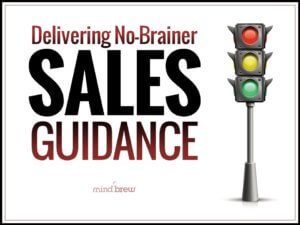First let me say that we love it when SellingBrew Playbook subscribers ask questions through our Ask the Network feature. These questions not only provide our editorial team with valuable insights into the concepts and topics that require further clarification, it’s extremely gratifying to help our subscribers with the specific issues they’re struggling with day-to-day.
But recently, we’ve been fielding some questions about sales training that illustrate just how easy it is for companies to rationalize not doing it. Here are a couple of examples:
- Shouldn’t product training count as sales training?
- If we hire experienced reps, won’t they already know what to do?
I wish I could say that these were one-off questions and isolated sentiments. But unfortunately, the rationalizations inherent in these questions are all-too-common when it comes to sales training.
A lot of companies mistakenly believe that they’re investing time and energy into sales training when their product managers stand in-front of the sales team talking about the latest speeds, feeds, features, and functions. Because it’s training, and because the audience is sales, these companies figure they can check the box on sales training—even though the information being conveyed is usually only tangentially related to how and why prospects decide to become customers.
And, there are a lot of companies who mistakenly believe that because they only hire salespeople with years of experience, sales training would be redundant and a waste of resources and time. Even though these years of experience may have been in completely different markets, with different customer and competitor dynamics, these companies figure that the experience will nonetheless enable reps to figure it all out for themselves…eventually.
Product training is important, of course. And sales experience is certainly a valuable asset.
But as convenient as they may be for rationalization, neither of these things are effective substitutes for real sales training.











